人教版初中英语九年级全册教案
Unit7SectionB2a2c教案人教版英语九年级全册
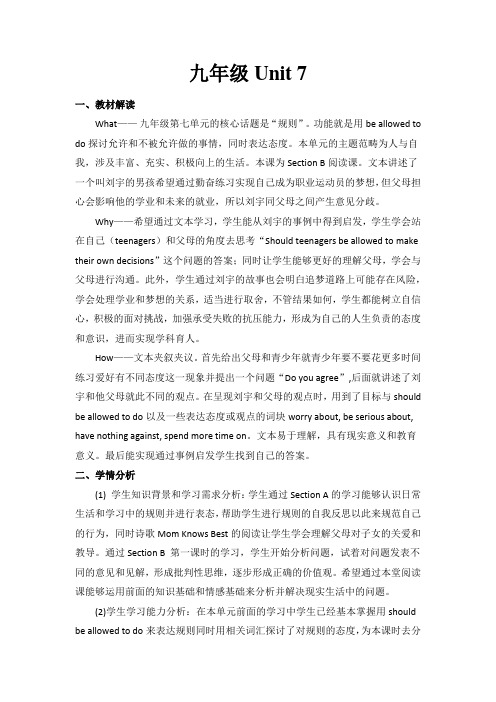
九年级Unit 7一、教材解读What——九年级第七单元的核心话题是“规则”。
功能就是用be allowed to do探讨允许和不被允许做的事情,同时表达态度。
本单元的主题范畴为人与自我,涉及丰富、充实、积极向上的生活。
本课为Section B阅读课。
文本讲述了一个叫刘宇的男孩希望通过勤奋练习实现自己成为职业运动员的梦想,但父母担心会影响他的学业和未来的就业,所以刘宇同父母之间产生意见分歧。
Why——希望通过文本学习,学生能从刘宇的事例中得到启发,学生学会站在自己(teenagers)和父母的角度去思考“Should teenagers be allowed to make their own decisions”这个问题的答案;同时让学生能够更好的理解父母,学会与父母进行沟通。
此外,学生通过刘宇的故事也会明白追梦道路上可能存在风险,学会处理学业和梦想的关系,适当进行取舍,不管结果如何,学生都能树立自信心,积极的面对挑战,加强承受失败的抗压能力,形成为自己的人生负责的态度和意识,进而实现学科育人。
How——文本夹叙夹议。
首先给出父母和青少年就青少年要不要花更多时间练习爱好有不同态度这一现象并提出一个问题“Do you agree”,后面就讲述了刘宇和他父母就此不同的观点。
在呈现刘宇和父母的观点时,用到了目标与should be allowed to do以及一些表达态度或观点的词块worry about, be serious about, have nothing against, spend more time on。
文本易于理解,具有现实意义和教育意义。
最后能实现通过事例启发学生找到自己的答案。
二、学情分析(1) 学生知识背景和学习需求分析:学生通过Section A的学习能够认识日常生活和学习中的规则并进行表态,帮助学生进行规则的自我反思以此来规范自己的行为,同时诗歌Mom Knows Best的阅读让学生学会理解父母对子女的关爱和教导。
人教版九年级英语全册Unit10单元教学设计

1.培养学生对健康的关注,使其认识到保持良好生活习惯的重要性。
2.增进学生对疾病患者的关爱,学会尊重、理解、帮助他们。
3.通过学习本单元,让学生认识到医学进步对人类健康的重要意义,激发他们对科学研究的兴趣。
4.引导学生树立正确的价值观,关爱生命,珍惜健康,关注社会公共卫生问题。
人教版九年级英语全册Unit10单元教学设计
一、教学目标
(一)知识与技能
1.掌握本单元的生词和短语,如:suffer, serious, disease, survive, recover, symptom, operation, cancer, AIDS等,并能正确运用到实际语境中。
2.学会使用一般现在时和现在进行时描述疾病和健康状况。
4.布置课后作业,要求学生复习本节课所学内容,为新课的学习打下基础。
五、作业布置
为了巩固本单元所学知识,确保学生对词汇、短语、语法和阅读技巧的掌握,特布置以下作业:
1.写作练习:请运用本单元所学的词汇和短语,结合一般现在时、现在进行时、一般过去时和过去完成时等时态,写一篇关于健康生活的短文,字数在100-120词左右。
3.分析课文中的祈使句、感叹句等句型,引导学生学会给出建议、表示关心和慰问。
4.通过对课文内容的分析,让学生了解疾病对人类的影响,培养他们的健康意识。
(三)学生小组讨论
1.教师将学生分成小组,针对以下问题进行讨论:
a. What are the common diseases in our daily life?
四、教学内容与过程
(一)导入新课
1.教师通过展示一组关于健康和疾病的图片,引导学生关注本单元的主题,激发他们的学习兴趣。
人教版九年级英语全册Unit6Whenwasitinvented课优秀教学案例

问题导向是本节课的核心教学策略。我将设计一系列有趣、具有挑战性的问题,引导学生主动探究、思考。例如,在讲解一般过去时态时,我会提问:“How did the inventors feel when they made their inventions?” “Can you describe the process of an invention using the past tense?”通过这些问题,激发学生的好奇心,培养他们的创新思维。
3.阅读技能:引导学生阅读课本中关于发明家的故事,分析文章结构,学习作者如何使用一般过去时态描述发明过程。同时,让学生关注文章中涉及的情感态度和价值观。
(三)学生小组讨论
1.分组讨论:将学生分成若干小组,每组选择一个发明家或发明创造,收集相关信息,包括发明时间、地点、过程、影响等。
2.小组展示:各小组整理好资料后,进行课堂展示,用英语介绍他们所了解的发明家或发明创造。其他小组认真聆听,并进行点评。
2.语言技能:学生能够听懂并获取关于发明创造的信息,提高听力水平。在口语方面,学生能够运用所学知识进行小组讨论,介绍某个发明及其对人类生活的影响。此外,通过阅读课文及相关发明家的故事,提高学生的阅读理解能力,培养他们的信息筛选和整合能力。
3.写作技能:学生能够运用一般过去时态,撰写一篇关于发明创造的小短文,描述发明的时间、地点、过程及影响。
人教版九年级英语全册Unit6Whenwasitinvented课优秀教学案例
一、案例背景
在我国初中英语教学中,人教版九年级全册Unit 6 "When was it invented?"一直是备受关注的一课。本课以发明创造为主题,旨在帮助学生掌握一般过去时态,了解世界各地的发明及其对人类生活的影响。作为一名特级教师,我深知本节课对于激发学生好奇心、培养创新意识的重要性。因此,本教学案例将结合课程主要内容,以实际教学为出发点,注重学科交叉,提升学生的英语素养。
人教版九年级上册英语教案(优秀5篇)
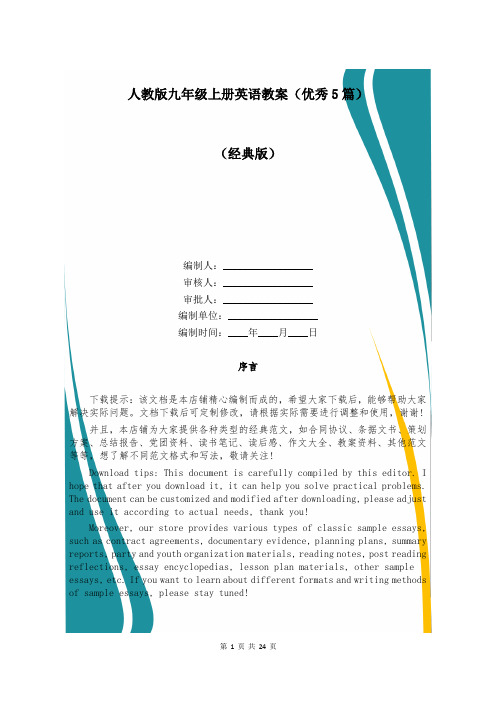
人教版九年级上册英语教案(优秀5篇)(经典版)编制人:__________________审核人:__________________审批人:__________________编制单位:__________________编制时间:____年____月____日序言下载提示:该文档是本店铺精心编制而成的,希望大家下载后,能够帮助大家解决实际问题。
文档下载后可定制修改,请根据实际需要进行调整和使用,谢谢!并且,本店铺为大家提供各种类型的经典范文,如合同协议、条据文书、策划方案、总结报告、党团资料、读书笔记、读后感、作文大全、教案资料、其他范文等等,想了解不同范文格式和写法,敬请关注!Download tips: This document is carefully compiled by this editor. I hope that after you download it, it can help you solve practical problems. The document can be customized and modified after downloading, please adjust and use it according to actual needs, thank you!Moreover, our store provides various types of classic sample essays, such as contract agreements, documentary evidence, planning plans, summary reports, party and youth organization materials, reading notes, post reading reflections, essay encyclopedias, lesson plan materials, other sample essays, etc. If you want to learn about different formats and writing methods of sample essays, please stay tuned!人教版九年级上册英语教案(优秀5篇)九年级是整个初中阶段的重要一年,因此教师需要学习先进的教育理念,认真准备每一次教案。
人教版九年级英语上册教案(全册)
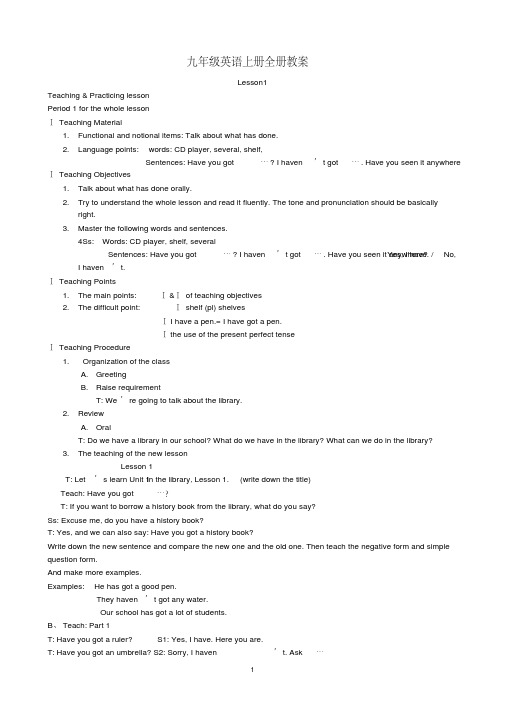
九年级英语上册全册教案Lesson1Teaching & Practicing lessonPeriod 1 for the whole lessonⅠ Teaching Material1.Functional and notional items: Talk about what has done.nguage points: words: CD player, several, shelf,Sentences: Have you got …? I haven’t got …. Have you seen it anywhere Ⅰ Teaching Objectives1.Talk about what has done orally.2.Try to understand the whole lesson and read it fluently. The tone and pronunciation should be basicallyright.3.Master the following words and sentences.4Ss: Words: CD player, shelf, severalYes, I have. / No, Sentences: Have you got …? I haven’t got …. Have you seen it anywhere?I haven’t.Ⅰ Teaching Points1.The main points: Ⅰ&Ⅰ of teaching objectives2.The difficult point:Ⅰ shelf (pl) shelvesⅠI have a pen.= I have got a pen.Ⅰthe use of the present perfect tenseⅠ Teaching Procedureanization of the classA.GreetingB.Raise requirementT: We’re going to talk about the library.2.ReviewA.OralT: Do we have a library in our school? What do we have in the library? What can we do in the library?3.The teaching of the new lessonLesson 1T: Let’s learn Unit 1 In the library, Lesson 1. (write down the title)Teach: Have you got …?T: If you want to borrow a history book from the library, what do you say?Ss: Excuse me, do you have a history book?T: Yes, and we can also say: Have you got a history book?Write down the new sentence and compare the new one and the old one. Then teach the negative form and simple question form.And make more examples.Examples: He has got a good pen.They haven’t got any water.Our school has got a lot of students.B、Teach: Part 1T: Have you got a ruler? S1: Yes, I have. Here you are.T: Have you got an umbrella? S2: Sorry, I haven’t. Ask …Ask the Ss to use Part 1 to make new dialogue in pairs and then ask some to do it in front of the class. Teach player” at the same time.B.Teach: severalT: Have you got a pen? How many pens have you got?S1: FiveT: We may also say: “You’ve got several pens.”Write down the word: severalB.Teach: shelfT: Just now we talked about the library, we know there are many books in the library. Where are the books put? Teach: on the shelf shelf (pl) shelvesB.Part2T: Now I’d like you to make a dialogue talking about borrowing books about different subjects.Do it in pairs first then ask some to do it.Analysis: books about … at the moment = now = right nowB.Part 3Dialogue 1Listen and answer: Well, when you borrow books from the library, you must be careful, but Jim is not careful. What happened? Where was the book?Then read it and learn the dialogue.Analysis: Have you seen it anywhere? ( tense and the use of anywhere)Dialogue 2Listen and answer: How about Tom? What has he lost? Where was it?Read and learn.Analysis: have lost (tense)Perhaps he’s seen it. ( ‘s is short for has)I saw it on Lin Tao’s desk five minutes ago. ( tense)B. Conclusion1. have got = have 2 several = a few 3.on the shelf 4. the present perfect tenseA.Wb. Ex1 &24.Homework1.Do Wb. Ex 3&42.Recite Part 3Lesson 2Reading lesson2 periods for Lesson 2ⅠTeaching Materialsnguage points:Words: already, yard, schoolyard, step, librarian, probably, pay, sadly, mark, bookmarkPhrases: used to, put down, pay for, come up withSentences: Her hobby is reading.So was the librarian.Now her lost books are usually returned to the library.ⅠTeaching Objectives1.Read the whole lesson and try to understand its content. Make sure to answer the questions in Wbcorrectly.2.Read the lesson fluently, the pronunciation and tone should be right.Ⅰ Teaching Points1.The main points---(1)&(2) in teaching objectives2.The difficult pointsA: already, “al” makes an / / soundB: the difference between “on” and “about”C: make sb. + adj.D: used to do sth.E: come up with an idea= think of an ideaPeriod 1Ⅰ Teaching Procedureanization of the classT: Today we are going to Lesson 2, in Lesson 2, we are going to talk about the library.2.ReviewT: Before we learn the new lesson, let’s go over what we learned yesterday.A.OrallyHave = have got eg. They don’t have any shelves.= They haven’t got any shelves.Has = has got eg. Does he have a CD player?= Has he got a CD player?Several=a fewOn the shelfThe construction and concept of the present perfect tenseB.Recite Part 2C.Wb. Ex33.The teaching of the new lessonA.Lesson 2T: We know we can borrow books from a library. But if we lose the books, what should we do? Letgo on to learn Lesson 2, we will know the answer in it.( write down Lesson 2)B.pay forWell, you should pay for it.Teach: pay, paid, paidPay for : give money to sb. for sth.C.onT: Why do people like to go to the library?T: Because there are books on many different subjects.D.knowledgePeople can learn much knowledge from them.E.Part 1 Pre-readF.Part 2Ask the Ss the read the passage and answer questions in their Wb. Ex 1G.Read and learnParagraph 1T: How old is the writer’s grandma?What was she?What is her hobby?Why does she love books?4.Homework.A. Read the end of the text and finish the exercises in Wb.Junior English for ChinaBook 3Lesson 3课型:讲练课ⅠTeaching Materials1.Functional and notional itemsAsk questions about something has donenguage MaterialsWords: encourage, once, abroad, copyPhrases: think of, encourage sb. to do sth., get sth. back, pick upSentences: Have you ever been abroad? Yes, just once.I’ve just cleaned the kitchen.Really? I did that hours ago.Grammar: The difference between the present perfect tense and the past indefinite tenseⅠTeaching Objectives1.Learn to ask questions about something has done2.Read the whole lesson fluently, and pronunciation and intonation should be right.3.Master the following materials(4 skills) Words: once, copyPhrases: think of, pick upSentences: Have you been abroad? Yes, only once.(3 skills) Words: encourage, abroadPhrases: get sth. back, be abroadⅠ Teaching Points1.The main points: (1)&(2) in teaching objectives2.The difficult points:A.“ever, just, already”, they should be put in the middle of “ have done”B. The difference between the present perfect tense and the past indefinite tenseⅠ Teaching Procedureanization of the class2.RevisionBefore we go on to learn the new lesson, let’s go over what we learn in Lesson 2.A.OralGrandma lost library books. If she really lose them, what should she do?Did the librarian have any ideas? What is it?What did they doB. Workbook Ex23.The teaching of the new lessonA.Lesson 3Can Grandma get all her lost books back? Let’s go on to learn Lesson 3.B.Read Part 1 and answer the following questions:Did Grandma get all her lost books back?How did she get them back?C.Read and learn*Think of:认为、想起、想出Eg: What do you think of it?I often think of my friends in Beijing.*Encourage sb. to do sth.Eg. The teacher thought a lot about how to encourage his students to study hard.*Pick up: pick it\them up*return sth. to sb.*get sth. from sb.D.Reading practiceE.Retell the storyF.Ask and answerHave you ever picked up a library book? Yes, I have\ No, I haven’t.Ask the students to ask and answer in pairs by using Part 2 and ask some to do it in class.Teach: abroad, onceDo Wb. Ex1G.Part 3Play and English songT: Have you ever listened to foreign music?Ss: Yes, we have.T: And we have just listened to it.Make sentences by using “ I have just…”Read and learnTeach: copyPoint out the difference between the present perfect tense and the past indefinite tense.The present perfect tense shouldn’t be used together with the past time.H.Conclusionthe use of “ever, just, already” in the present perfect tensethe difference between the present perfect tense and the past indefinite tense4.HomeworkA.Wb. EX2&3B.Go over the language pointsLesson 4课型:练习课ⅠTeaching Materialsnguage MaterialsWords: spoil, as, screenPhrases: on the computer, find outSentences: I guess somebody else has borrowed it.Could you find out who has taken it?Grammar: The present perfect tenseⅠTeaching Objectives4.Read the whole lesson fluently, and pronunciation and intonation should be right.5.Learn to read the information on the library cards and the computer screen.6.Master the following materials(4 skills) Word: asphrase: on the computer, find out(3 skills) Words: spoil, screenⅠ Teaching Points3.The main points: (1)&(2) in teaching objectives4.The difficult points: learn to read the information on the library cards and the computer screenⅠ Teaching Procedureanization of the classToday, we are going to learn Lesson 4. In Lesson 4, we’re going to talk about the information on thelibrary cards and the computer screen.6.RevisionBefore we go on to learn the new lesson, let’s go over what we learn in Lesson 3.A.OralHow could Grandma get all her lost books back?the use of the adverbs in the present perfect tense.7.The teaching of the new lessonA.Lesson 4Yesterday, we learned that grandma usually borrowed books from the library. There is a new librarytoday. If you want to read books, how can you find them? Let’s go on to learn Lesson 4.B.Part1I’d like you to listen and do Wb. Ex.1C.Part 2Ask the students to write down something about the school librarian and report it to the class. Teach:as He works there as a shop assistant.D.Part 4Learn to read the information on the cards and the computer screen.E.Part 3Listen and answer: What does the boy want to borrow?What’s its name?Who has borrowed it?Read and learn.has borrowed, has taken, has got( the present perfect tense)find outRead and act.F.Part 5Read and learn.G.Checkpoint 1H.Wb. Ex.2&58.HomeworkA.Wb. Ex 3B.Go over the whole unit.Lesson 5课型:讲练课ⅠTeaching Materials4.Functional and notional itemsA. Learn to ask how long sb. has done sth.B. Learn to talk about if someone has been to a place.nguage MaterialsWords: surf, surfing, surfer, wave, Hawaii, beach, twice, Bondi, none, Newquay, water-ski, canoe Phrases: have a try, since last Wednesday, learn sth. from sb. how to do it, several timesSentences: What’s …like?How long have you been in Sydney?Have you ever been to …?Grammar: the present perfect tenseⅠTeaching Objectives7.Learn to ask questions about something has done8.Read the whole lesson fluently, and pronunciation and intonation should be right.9.Master the following materials(4 skills) Words: surf, surfing, surfer, wave, beach, twice, nonePhrases: have a trySentences: Have you been to…? Several times.(3 skills) Words: water-ski, canoe(1 skill) Words: Hawaii, Bondi, NewquayⅠ Teaching Points5.The main points: (1)&(2) in teaching objectives6.The difficult points:A.“ever, just, already”, they should be put in the middle of “ have done”B. The difference between the present perfect tense and the past indefinite tenseⅠ Teaching Procedureanization of the classToday, we’re going to talk about water sports.2. RevisionRevise the names of the sports they have learnt: roller-skating, skating, jump, race, skiing.10.The teaching of the new lessonA.Lesson 5And swimming is a kind of water sport because you have to swim in the water.Well, what other water sports do you know? Let’s go on to learn Unit 2 Water sports.e colour page1 to teach: surf, surfing, surfer, wave, water-skiing, canoe.C.Part 1Listen and answer: Who can surf, Ted or Bruce?How long has Bruce been in Sydney?Why did he come to Sydney?Who teach Bruce to surf?Read and learn:What’s …like? = How is …?Since last WednesdayLearn sth. from sb.Have you ever been to …?Have a tryHow to do itD.Read and act.E.Part 2Have you ever surfed?Have you ever been to Hawaii?Ask and answer in pairsLearn: Bondi, Cape Town, Newquay, noneNo one 人单数No one is herenone 人/物单数/复数None of them is here.F.Wb. Ex3. 2 . 1 .G.ConclusionSurf, surfing, surfer, waveHe’s a surfer. Have a tryHow long have you been in …?Have you ever been to …?11.Homeworkwb. Ex 2P.S.The writing on the blackboardUnit 2 Water sportsLesson 5surf ⅠWhat’s …like? = How is …? Have a trylearn sth. from sb.surfing ⅠHow long have you been in …?surfer Since last Wednesday no one 人/ 单wave ⅠHave you ever been to …? none人/物单/复Hawaii ⅠNone of us has. none of us (true)Cape Town No one has. no one of us (false)Lesson 6ⅠTeaching MaterialsWords: describe, especially, attract, so-called, possible, since, part-time, although, fit, prize, competition, event, Olympic, Waikiki, Honolulu, San FranciscoPhrases: all over, large numbers of, no matter, both…and…, give up, ever since, the Olympic Games Sentences: Now it is enjoyed by people all over the world.You can always find surfers out riding the waves.In the morning, he works as a part-time assistant in a surf shop.ⅠTeaching Objectives1.Try to understand the whole passage and read the whole lesson fluently and the pronunciation andintonation should be right.2.Master the following materials:4Ss Words: describe, especially, attract, so-called, possible, since, part-time, although, fit, prize,competition, event, OlympicPhrases: all over, large numbers of, no matter, both…and…, give up, ever since, the Olympic Game Sentences: Now it is enjoyed by people all over the world.You can always find surfers out riding the waves.In the morning, he works as a part-time assistant in a surf shop.3.Master the following materials:3Ss Words: Waikiki, Honolulu, San FranciscoⅠ Teaching Points1.The main points: (1) &(2) in teaching objectives2.The difficult points: A. the use of “although” B. the use of “no matter”C. the use of “ both…and…”Ⅰ Teaching ProcedurePeriod 1anization of the classTalk about surfing2.ReviewHave you ever been to Qingdao?Who has ever been to Bondi Beach? None of us.Has anybody water-skied before? Nobody has.3.The teaching of the new lessonA.Lesson 6In Lesson 5, we learned some water sports. Today, we are going to talk about one of them----surfing.B.Talk about surfingWhere is the best place for surfing? Why?Have you ever watched people surf?What do you think of it?Ask the students to say something about it.Teach: fit, prize, competitionSurfing will make you fit( healthy). Maybe you can take part in a surfing competition, then you maywin a prize.Part 1 Pre-read Ask and answer then teach: watch sb. do sth.; describe sth.C.Part 2Read and do wb. Ex.1D.Conclusion.fit, win a prize4.HomeworkA.Go over what we learn todayB.Read the passage and find out all the new words, try to guess their meaning.Period 2Teaching Procedureanization of the classLearn the passage2.ReviewWatch sb. do sth.; fit(healthy); win a prize3.The teaching of the new lessonA. Paragraph 1Find out the key sentence. Then learn the new language points.one of…; be enjoyed by sb.; all over the world= everywhere in the world;be famous for\ as; especially; attract sb. to somewhere; large numbers of people(it is used to modify countable nouns)= a number ofRead this paragraph after the tape and then read it together. Ask some to read it in classB. Paragraph 2Find out the key sentence. Then learn the new language points..Read this paragraph after the tape and then read it together. Ask some to read it in classC.Paragraph 3Find out the key sentence. Then learn the new language points.D.Paragraph 4Find out the key sentence. Then learn the new language points.E.Conclusion4. HomeworkA.Wb. Ex. 2&3B.Retell the storyLesson 7课型:讲练课ⅠTeaching Materials1.Functional and notional itemsLearn to talk about something has donenguage materialsWords: such, fail, practice, New Zealand, businessPhrases: such great fun, on business, so farSentences: Time flies!He’s gone to New Zealand on business.ⅠTeaching Objectives1.Learn to talk about something has done.2.Try to understand the content and read the dialogue fluently, the pronunciation and intonation should beright.3.Master the following materials:4 skills Words: such, fail, practice, businessPhrases: so far, on businessSentences: He’s gone to …4.Master the following materials:2 skills Words: New ZealandⅠTeaching Points1.The main points: (1) & (2) in teaching objectives2.The difficult pointsA.such great funsuch+adj. +n.(不可数/复数)such a + adj. + n.(可数名词单数)与so的区别B.have been surfingC.practice sth.\ doing sth.D.gone to & been togone to去了,强调不在说话地点been to 去过,强调对某地有所了解,可以在说话地点ⅠTeaching Procedureanization of the classWe are going to talk about Bruce and Ted again. In grammar, we are going to talk about the present perfect tense.2.RevisionA.Retell the story in Lesson 6.B.Wb. Ex2&33.The teaching of the new lessonA.Lesson 7In lesson 5, we know Bruce will show Ted how to surf. Can Ted surf now?B.Listen and answerCan Ted surf? What has Bruce been doing every day? Why?When is Ted leaving for home?How about Bruce?Where is Bruce’s uncle?C.Read and learnTeach: *on Bondi Beach*such great fun: very funnysuch+adj. +n.(不可数/复数) such beautiful flowerssuch a + adj. + n.(可数名词单数) such a beautiful flowerso+ adj. So beautiful a flower前,要用“so”如果在数量词“many, much, few, little”eg: so much water, so many people* fail (in) the examfail to do sth.=can’t do sth.eg: fail the exam=not pass the examfail to catch the bus= miss the bus* need more practicepractice: 练习,实践(为不可数名词)如:Practice makes perfect.Practice : 练习(为及物动词)如:practice doing sth.* Time flies.* gone to去了,强调不在说话地点been to 去过,强调对某地有所了解,可以在说话地点eg: Where is he? He’s gone to his home.* on businessD.Reading Practice.E.Part 2 Ask and answeryet 用于否定句,一般疑问句及条件状语从句already用于肯定句,如果用于一般疑问句则表示惊讶的语气F.Answer the questions in groups. Teach: so far: up to nowAsk some to do it in classG.ConclusionH.Wb. Ex 14.HomeworkA.Recite Part 1B.Go over the whole lessonLesson 8课型:练习课ⅠTeaching MaterialsWords: cross, channel, mainland, slow, journey, among, proud, pride, unless, shot, truthPhrases: come true, slow down, be proud of, speak highly of, not only…but also…Sentences: Among them were his parents.He is not only the pride of our school, but also the pride of all the people in Hainan.ⅠTeaching Objectives1.Read the passage in Part 3 and try to understand its meaning. Read it fluently and the pronunciation andintonation should be right.2.Finish all the exercises in this lesson.3.Master the following materials as four skills:Words: cross, channel, mainland, slow, journey, among, proud, pride,Phrases: come true, slow down, be proud of, speak highly of, not only…but also…Sentences: Among them were his parents.He is not only the pride of our school, but also the pride of all thepeople in Hainan.4. Master the following materials as three skills: words: unless, shot, truthⅠTeaching Points1.The main points: (1) & (2) in teaching objectives如果连接两个主语时,用就近一致原则。
最新 人教版九年级 英语上册全册教案
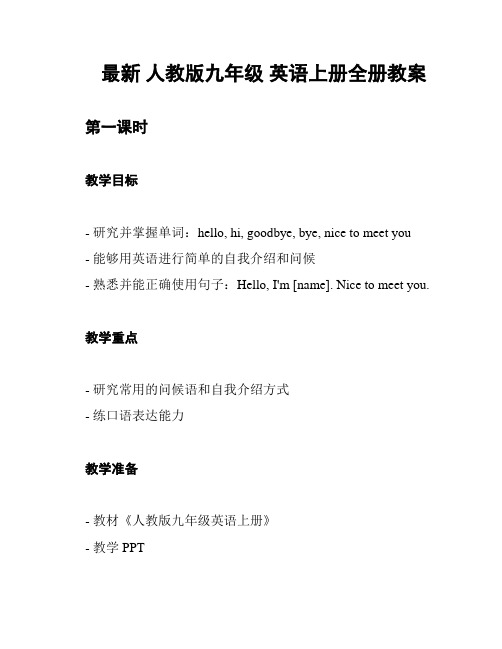
最新人教版九年级英语上册全册教案第一课时
教学目标
- 研究并掌握单词:hello, hi, goodbye, bye, nice to meet you
- 能够用英语进行简单的自我介绍和问候
- 熟悉并能正确使用句子:Hello, I'm [name]. Nice to meet you. 教学重点
- 研究常用的问候语和自我介绍方式
- 练口语表达能力
教学准备
- 教材《人教版九年级英语上册》
- 教学PPT
教学步骤
1. 导入新课,向学生简要介绍本节课的内容,并激发学生研究
的兴趣。
2. 分发教材,让学生跟读单词:hello, hi, goodbye, bye, nice to meet you。
3. 解释单词的意思,帮助学生掌握词汇。
4. 利用示范和展示图片等方式,让学生理解并掌握句子:Hello, I'm [name]. Nice to meet you.
5. 引导学生进行口语练,让他们用所学内容进行自我介绍和问候。
6. 收集学生的口语表达,进行点评和纠正。
7. 结束本节课,作简单复,并布置下节课的预内容。
教学延伸
- 练更多的问候语和自我介绍方式,丰富学生的口语表达能力。
- 制作小组或角色扮演活动,让学生在真实情境中运用所学内容。
教学评价
- 观察学生的参与程度和口语表达能力,及时给予鼓励和指导。
- 收集学生的口头回答、书面练习,进行评估和改进教学策略。
九年级英语教案人教版

九年级英语教案人教版【篇一:人教版新目标九年级英语最全教案】九年级全一册英语学案及教学设计unit 1 how do you study for a test?一、教学目标1、语言目标 1)询问别人的学习方法2)学习讨论各种学习方法和策略,学会评价各种学习方法的优劣2、知识目标1)how do you study for a test?i study by ving .2) the way to do sththe way of doing sthhave trouble doing sth 的用法3、能力目标 1)通过讨论找到适合自己的学习方法,找出自己在英语学习中的困难2)学会给出关于学习方法的建议二、重点知识1、重点单词flashcard vocabulary aloud pronunciation memorize grammar frustrating quickly spoken pronounce mistakes challenge solution realize matter afraid complete impress trouble soft deal unless regard influence friendship development face基本要求:会读、会写、会用。
2、重点短语make mistakes be afraid to do sth laugh at enjoy doing sth the way to do sth have trouble doing sthend upspoken english practice doing sth too much look upmake vocabulary liststry one`s best to do sth基本要求:会读、会写、会用。
3、重点语法 1)how 引起的特殊疑问句及其回答2)the way to do sth the way of doing sthhave trouble doing sth 的用法基本要求:理解其含义,学以致用。
人教版英语9年级全册Unit12_SectionA(1a-2d)教案
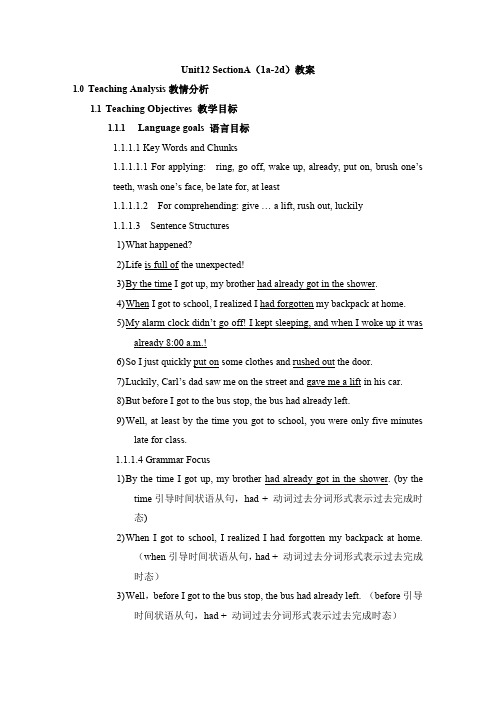
Unit12 SectionA(1a-2d)教案1.0Teaching Analysis教情分析1.1Teaching Objectives 教学目标1.1.1Language goals 语言目标1.1.1.1 Key Words and Chunks1.1.1.1.1 For applying: ring, go off, wake up, already, put on, brush one’steeth, wash one’s face, be late for, at least1.1.1.1.2 For comprehending: give … a lift, rush out, luckily1.1.1.3 Sentence Structures1)W hat happened?2)L ife is full of the unexpected!3)B y the time I got up, my brother had already got in the shower.4)W hen I got to school, I realized I had forgotten my backpack at home.5)M y alarm clock didn’t go off! I kept sleeping, and when I woke up it wasalready 8:00 a.m.!6)S o I just quickly put on some clothes and rushed out the door.7)L uckily, Carl’s dad saw me on the street and gave me a lift in his car.8)B ut before I got to the bus stop, the bus had already left.9)W ell, at least by the time you got to school, you were only five minuteslate for class.1.1.1.4 Grammar Focus1)B y the time I got up, my brother had already got in the shower. (by thetime引导时间状语从句,had + 动词过去分词形式表示过去完成时态)2)W hen I got to school, I realized I had forgotten my backpack at home.(when引导时间状语从句,had + 动词过去分词形式表示过去完成时态)3)W ell,before I got to the bus stop, the bus had already left. (before引导时间状语从句,had + 动词过去分词形式表示过去完成时态)1.1.2Ability goals 能力目标1.1.2.1 学会用when/ by the time引导时间状语从句,用“had+动词过去分词形式”谈论过去的事情。
- 1、下载文档前请自行甄别文档内容的完整性,平台不提供额外的编辑、内容补充、找答案等附加服务。
- 2、"仅部分预览"的文档,不可在线预览部分如存在完整性等问题,可反馈申请退款(可完整预览的文档不适用该条件!)。
- 3、如文档侵犯您的权益,请联系客服反馈,我们会尽快为您处理(人工客服工作时间:9:00-18:30)。
新目标英语九年级全册教案Unit 1 How do you study for a test?Section A 1a—2c【学习目标】知识目标:1、熟练掌握以下句型:(1)A: How do you study for a test?B: I study by working with a group?(2)A: Have you ever studied with a group ?B: Yes, I have. I‘ve learned a lot that way.2、掌握―by doing‖结构3、熟练掌握词汇:aloud,pronunciation, flashcard, vocabulary技能目标:能用how引导的特殊疑问句和by短语对学习方法进行讨论。
情感目标:能与别人交流学习方法,形成相互交流相互促进的学习氛围。
【课前准备】I、(1)你认为下面图片中的人或物哪些对你的英文学习有帮助,快把它们选出来吧。
(2)你能根据图片,结合课本1a和2a内容,用英文写一写学习英语的方法吗?(越多越好哦!)1、对照课前准备I的内容,在班里举办一个自由访谈,向你认为英语成绩优异的同学请教一下学习方法,或者把你的经验告诉其他同学。
并由老师帮助汇总。
2、在1a中选出你认为适合自己的学习方法。
并在1a中补充你采用的其他方法。
3、观察1a中三幅图片,他们都在做什么?用英语怎么说?1、听1b中孩子们谈论的学习英语的方法。
根据所听录音,将1b中的人名与1a图片中的字母匹配。
2、听两遍录音,完成下面的对话。
A: You did really well on the last English test, didn‘t you, Mei?C: Yeah, I did OK.A: well, how did you study?C: By.A: Maybe I‘ll try that. How did you study, Pierre?D: By. She was really happy I asked.A: That‘s interesting., Antonio?E: I like to study by. But sometimes my mother thinks I‘m listening to music. And then she gets mad.观察与思考:通过刚才的听力训练,请你来总结一下:向他人请教学习英语的方法应该用来提问。
告诉他人自己的学习方法应该用结构来表达。
3、Pairwork: 根据你总结的句式,仿照1c对话,两人一组,试着练习下面的句型,A: How do you study …?B :I study by …?4、熟读2a的五个问题。
5、听2a录音,2a中的问题有哪些在录音中提到?请在你听到的问题前打(√)。
6、听2b录音,从2b的句子中找到2a问题的答语。
并将2b的字母与1a的序号匹配。
7、听录音,完成下面的对话。
Girl1: Welcometo the English club. Today we're going to talk about the best ways to learn English.Who has an idea?Boy 1: Do you learn English by?Girl 2: No. It's too hard to understand the voices .Boy 1: What about? Do you learn English that way?Girl 2: I think so. It helps to write every day.Girl 3: Have you ever studied ?Girl 2: Yes,I have! I've learned a lot that way.Girl 1: Do you ever with friends?Girl 2: Oh,yes. It improves my speaking skills.Boy 1: What about ?Girl 3: I do that sometimes. I think it helps.观察与思考:这些学习方法的效果如何呢?用什么句式对它们进行评价?请参照2b内容进行总结,并把这些句式记录下来。
1、在1a和2a中出现很多学习英语的方法,你能把它们找出来吗?2、Pairwork: 采用合理的学习方法很重要,针对自己的情况,与同桌一起讨论从1a和2a中找到的学习方法,对其效果进行评价。
评价时可借助如下对话形式:A: Have you ever studied with a group?B: Yes, I have. I‘ve learned a lot that way.I、用所给单词的适当形式填空。
1.Do you learn English by (watch)English-language videos?2.Do you often practice (speak) English with friends?3.What about (read) the text aloud?4.Have you ever (study) with a group?5.They are studying the (pronounce) of English.II、根据所给汉语提示完成句子。
1.-How do you study for the test?- (通过制作抽认卡).2.-How does Pierre study Chinese?-(通过朗读课文).3.-How does Mei study English?-(通过制作词汇表).4.-How does Tom improve his listening skills?-(通过听磁带).5.-How are you going to study to improve your spoken English?-I'm going to study (通过和朋友练习对话以及大声读练习发音)I have made in class.【课堂反思】1、你和你的朋友在学习的过程中遇到很多困难,当你们互相探讨学习方法时,应采用什么句式呢?请你把它总结出来。
2、将本课学到的学习方法记录下来。
在以后的学习中,希望你能将这些方法学以致用,使你的学习成绩更上一层楼。
【家庭作业】1、结合课堂反思情况和学习目标,熟练掌握本课的语言结构。
2、利用本课所学重点句型,并联系你的生活实际,编写对话。
对话内容:你和你的英国朋友Mike互相请教学习英语和汉语的方法。
3、依据下一个学案的学习目标,完成课前准备。
Unit 1 How do you study for a test?Section A 3a—4【学习目标】知识目标:1.熟练掌握以下句型:(1)Lillian Li, for example,said the best way to learn newwords was by reading English magazines.(2)She said that memorizing the words of pop songs alsohelped a little.(3)Sometimes, however,he finds watching moviesfrustrating because the people speak too quickly.(4)We get excited about something and then endupspeaking in Chinese.2熟练掌握词汇:differently, quickly, specific, memorize, grammar, frustrate, add技能目标:能用知识目标1中的句型对各种学习方法进行讨论,探讨最佳学习方法。
情感目标:能根据自己的实际采用适合自己的学习方法,形成个性化的学习特点。
【课前准备】I、回忆过去学过的程度副词,并按照由弱到强的顺序排列。
(弱)————————(强)II、对于各种学习英语的方法,哪些是你经常采用的?哪些是你有时采用的?哪些是你从来不用的?把它们列举出来。
often:sometimes:never:III、在众多的学习英语方法中,你认为哪些是最佳的方法,而哪些是最不实用的?the best ways to learn English:the ways that aren‘t helpful at all:1、Groupwork:小组讨论课前准备III的内容,阐明自己观点,并说明自己的理由。
2、将讨论的结果分类汇总。
The best way to learn English Reason1234The way that isn‘t helpful at all Reason1 12 23 341、在3a中许多学生对于英语学习,提出了具体的建议。
快速阅读短文,回答下列问题。
(1)How many students talked about the ways to learn English?(2)How many ways did every student talk about?2、仔细阅读短文,将每个学生提到的学习方法在3a中标出3、再细读短文,完成3a的表格。
4、自我检测一下你对课文的理解,相信你是最棒的。
How do you learn best ?This week we asked students at NewStar High School about the best waymore English. Many said they learnt byEnglish.Some students had more specific suggestions. Lillian Li, for example, said the best waynewwords was by English magazines.She said that the words of pop songs also helped a little. When we asked a boutgrammar, she said. ―I nevergrammar.It's too boring.‖Wei Ming feels differently. He's been learning English for six years and really loves it. He thinksgrammar is a great waya language. He also thinks thatEnglish movies isn't a bad way because he can watch the actors say the words. Sometimes, however, he findsmovies frustrating because the people speak too quickly.Liu Chang said thatthe English club at school was the best wayher English.Studentsget lots of practice and they also have fun.She added thatconversations with friends was not helpful at all.―We get excited about something and then end up in Chinese,‖ she said.观察与思考:通过刚才的填空练习,你发现下面这些用法的规律了吗?(1)way后面既可跟作定语,也可以跟结构作定语。
